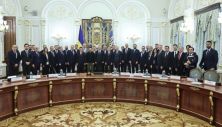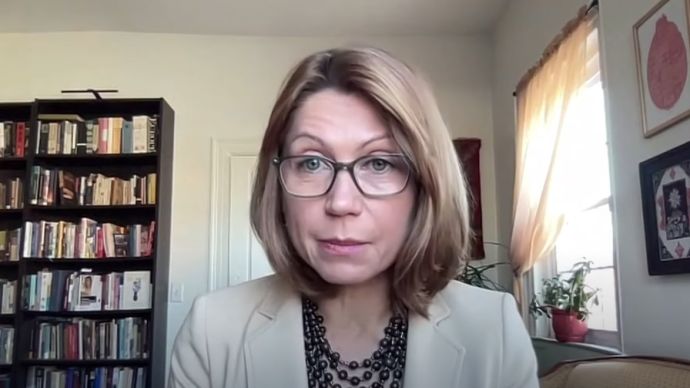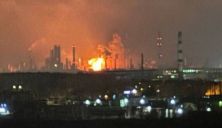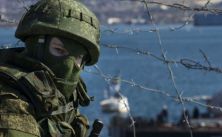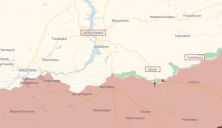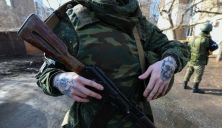An expert in nuclear armaments and energy, Mariana Budjeryn, who is also a Senior Research Associate at Harvard Kennedy School’s Belfer Center, have briefed UATV about the possibility of Ukraine creating its own nuclear weapons again as well as about the consequences of the nuclear weapon development.
— Is it really possible for Ukraine to create the so-called dirty bomb under modern conditions, as some Western tabloids have been claiming a couple of days ago?
— Well, a dirty bomb is actually not very difficult to create for any country that has access to nuclear materials, such as, for instance, spent nuclear fuel from nuclear power plants. The thing is, a dirty bomb is not what people usually think it is.
It’s a weapon of contamination.
It doesn’t have these mushroom clouds and big explosions; it’s not some kind of improvised nuclear weapon or bomb.
It’s a weapon of radiological contamination, and it would cause disruption more than destruction.
So, this constant narrative — that if we recall, Russia first conjured up about two years ago in October 2022, suggesting that Ukraine is planning to create and explode this dirty bomb — makes absolutely no sense at all.
Yes, it is possible, not just for Ukraine but for any country to gather a bunch of radioactive materials, attach them to a conventional explosive device, and then explode it in a highly populated area to cause all sorts of havoc.
But this hasn’t really been done before simply because it makes no sense, certainly not in a large-scale conventional war like what we see in Ukraine today. It’s an inhumane type of weapon. It is very non-humanitarian, I would say. It wouldn’t affect anything militarily but would rather contaminate the ecology of both the country that used the bomb and the victim country.
— Is it really possible for Ukraine, under current conditions, to create or recreate nuclear weapons or even a nuclear warhead? With the facilities that Ukraine currently has, can it build such a weapon on its own, without outside partners?
— This would be a very difficult task based on Ukraine’s current capabilities. There are two things that are important to understand about the creation and manufacturing of nuclear weapons.
First, it’s the technology of the 1940s, when the United States created these weapons as part of the Manhattan Project. It’s not cutting-edge or new technology that only a privileged few have access to. It used to be thought that only developed, industrialized countries could create a nuclear weapon, but that was proven untrue by countries like China in 1964, and later by Pakistan, India, and North Korea.
So, if a country is determined to develop nuclear weapons, it will find a way. It can train physicists, and it’s possible.
Now, the question for Ukraine is not whether it’s possible today. Ukraine currently lacks the key parts of the full fuel cycle — the kinds of production facilities and technologies needed for creating weapons-grade, highly enriched uranium or plutonium for such a bomb.
Can it build that up over time? Yes, given enough investment and political will, but it’s a very costly undertaking, not just financially but also in terms of international political consequences.
There’s a broad-based international non-proliferation regime in place. Ukraine is a party to the Treaty on the Non-Proliferation of Nuclear Weapons (NPT) as a non-nuclear weapon state since it signed the Budapest Memorandum in 1994.
For Ukraine to develop nuclear weapons, it would need to withdraw from the NPT, invest heavily in the necessary capabilities, and all of this takes time — time for other countries, including the United States, to impose sanctions or costs.
Ukraine would certainly lose Western military assistance if it pursued nuclear weapons, and it could face international sanctions like those imposed on Iran.
Look at how long Iran has been enduring sanctions due to its nuclear program.
— That seems like a dire consequence. Even President Zelenskyy mentioned there are two options: either Ukraine recreates nuclear weapons or joins NATO for security. The Budapest Memorandum of 1994 was violated in 2014. Returning to Iran and speaking of sanctions, would the world’s attitude toward Iran change if they were to announce they have nuclear weapons?
— It’s hard to predict these things. North Korea developed nuclear weapons and is now a nuclear state outside of the non-proliferation regime. It’s still under sanctions and is viewed as an adversary of South Korea and the United States. Relations haven’t improved. Ukraine is different from North Korea and Iran. It doesn’t pose the same kind of threat to the Western world or the values the West pursues.
However, Ukraine developing nuclear weapons would still bring negative consequences. Russia, for instance, would do everything in its power to sabotage or undermine a Ukrainian nuclear program. The time it takes to develop nuclear capabilities is also a period of vulnerability when those opposed to it have the chance to intervene and stop the program.
I understand why President Zelenskyy brings up this choice of NATO membership or nuclear weapons. It’s not necessarily a credible threat to develop nuclear weapons but a way to highlight Ukraine’s security predicament.
Ukraine gave up its nuclear option in 1994 with the NPT, but it hasn’t received real security guarantees like NATO allies under Article 5 of the Washington Treaty. Ukraine finds itself in a security vacuum, which has allowed Russia to act aggressively.
I see Zelenskyy’s comments as a way to emphasize this issue and push Western partners to act.
Without NATO membership and robust security guarantees, Ukraine may revisit the nuclear option in the future.
— Do you see a future without nuclear weapons? Can humanity move away from this destructive security measure to something more civilized?
— One certainly hopes so. Efforts for global nuclear disarmament have been ongoing since nuclear weapons were first created. The scientists involved in creating them have long advocated for disarmament. After the end of the Cold War, it seemed for a brief moment that there might be a chance for global nuclear disarmament, but that hasn’t happened. Over the decades, nuclear weapons have become ingrained in the national security structures of nine countries. It’s very difficult to extricate them.
There has been a renewed push for disarmament with the Treaty on the Prohibition of Nuclear Weapons, which came into force in 2021. However, none of the nuclear states have joined the treaty. The global nuclear order is discriminatory and unfair, and this will eventually backfire.
The war in Ukraine is a prime example of a nuclear power using its status to act with impunity, while non-nuclear states are left vulnerable.
Ukraine’s war is not just about its independence but also about the future of nuclear weapons as tools of international politics.
Read also: Why Peace Is Still Not an Option in the Middle East? Commenatary of Marcin Krzyzanovski
